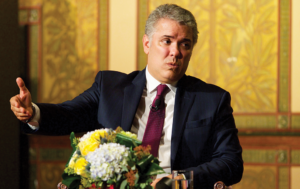Colombian President Iván Duque Márquez (GRD ’07) called on countries to unify their support for the diplomatic blockade against Nicolás Maduro, whose position as the president of Venezuela has been a subject of international scrutiny, at an event Thursday.
The event, titled “The Policy Agenda for Latin America,” was hosted in Gaston Hall by the Latin America Leadership Program, the Center for Latin American Studies and the Colombian Law Students Association at Georgetown University Law Center. Dean William Treanor moderated the event.
Duque urged countries and leaders around the world to continue putting pressure on Maduro and to push to allow humanitarian aid to enter Venezuela.

“We should do everything we can to let the Venezuelan people liberate from the most cruel dictatorship we have seen in years,” Duque said. “As president of Colombia, I will continue promoting the diplomatic blockade to get Venezuelan people free of Nicolás Maduro.”
A staunch critic of Maduro’s presidency, Duque denounced Maduro for human rights abuses in front of the International Criminal Court in September 2018 and encouraged the continuation of the diplomatic blockade of Venezuela, according to The New York Times.
The blockade has the support of over 50 countries that are denouncing Maduro and recognizing Juan Guaido, the current president of the National Assembly and leader of the opposition, as the true president of Venezuela. The effort began July 5 in response to multiple accusations against Maduro of illegitimate re-election to office in May 2018 and his authoritarian rule, according to CBC.
International support is essential to ensuring the success of the diplomatic blockade, according to Duque.
“I always said that we need to create a diplomatic blockade,” Duque said. “We have now more countries in the Western hemisphere recognizing Juan Guaido as the president. Now we have most of the European countries, and yes, we have to keep on channelling that diplomatic blockade.”
Maduro has been described as a dictator by many countries and leaders, including U.S. President Donald Trump, as well as mainstream media. His presidency, which began in November 2013, has withstood instability because of the decline in Venezuela’s socio-economic status and the increase in crime, hyperinflation, poverty and hunger during his tenure.
In addition to fighting for humanitarian aid to enter Venezuela, Duque said Colombia would help liberate Venezuelan refugees from Maduro’s oppressive regime.
“It is our moral duty, first of all, to express fraternity,” Duque said. “The second thing to recognize is that in the 20th century, many Colombians went to Venezuela in search for a home, and Venezuela brothers opened their arms and received them. So we will do all we can to be well-organized and to help with the migration of citizens.”
With socio-economic conditions in Venezuela deteriorating, an estimated 4,000 people cross the border into Colombia every day, according to Foreign Policy.
Duque, who received his Master’s in Public Policy Management from Georgetown, was invited to speak in Gaston Hall as a part of his first official visit to the United States as president after his June 2018 election. Duque not only shared Colombia’s foreign policy, but also domestic issues with the campus community.
Duque emphasized the need for a gradual replacement of the illegal drug economy with a more legitimate, legal economy to support the Colombian people.
“My goal is by the end of my administration to eradicate more than 60 percent of the illegal drugs that we have — but more than just eradicate, make people that are living off of an illegal crop be part of the legal economy,” Duque said.
Colombia recently signed a historic agreement with the U.N. Office on Drugs and Crime in 2017 to address the country’s widespread coca cultivation, according to the UNODC. The area under coca cultivation in Colombia reached the highest-ever figure of 171,000 hectares in 2017, according to the UNODC’s Coca Cultivation Survey Report for Colombia.
Colombia has collaborated with the United States to address drug issues in the past, according to Duque.
“Our relationship has been, for a long time, a brotherhood relationship,” Duque said. “I am very glad and pleased that we keep receiving support from the White House and also from Congress when it comes to things like the drug problem.”
The drug problem in Colombia is often attributed to high levels of domestic production of illegal drugs, according to Duque. In 2016, an estimated 866 metric tons of cocaine were produced in the country, according to the UNODC. However, the issue of drug consumption within the country should also be taken seriously, Duque said.
“We need to put an end to the exponential growth of the illegal drugs, and we also need to consider that Colombia is no longer a producing country, but also a consuming country,” Duque said. “We have 800,000 people consuming drugs in Colombia, and we are a low-income country.”
Despite the drug crisis that has plagued the country, Colombia has achieved incredible economic growth, according to Duque.
“When we talk about Colombia, always the conversation of drugs comes into the table, but in fact, Colombia has a very vibrant economy,” Duque said. “I would say that one of the things that we have to praise is that during the last 20 years, Colombia passed from being considered a failed state to a vibrant economy.”




















